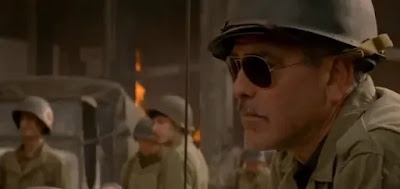Guerra Gratis Artis
or
Saving Private Collections
The Olympics are going on, which always reminds of the great debt we owe to the Greeks and to Greek mythology, all of the written records of that civilization that has enriched our lives and manage, over the centuries, to still reflect and caution us, through its stories. And we couldn't thank the Greeks, if we don't, in turn, thank the Jews, who saved those written records of Greek mythology from being destroyed in the many upheavals resulting from so many transitory religious and political conflicts. Long term accomplishments can be utterly obliterated by something so blinkerdly short-sighted. History can be erased.
That, ultimately, and a bit ironically, is the point behind The Monuments Men, George Clooney's new movie, which he directed (and co-wrote with his regular collaborator Grant Heslov). In it is told the tale of the men who, during the second World War, tracked down confiscated art looted from Nazi occupations, if it could be found, in order to return it to its rightful place before the war. They did this during the war in progress.
It sounds like a fool's errand. War is messy. Profoundly messy. To everything. It is chaos incarnate. To think that one could actually try and put some order back into it, while the war is still waging, is more than a little wistful, it's downright barmy, like literally trying to stop a tidal wave with a teacup. It's the idea of someone with an out-sized sense of justice, or a die-hard romantic...or an academic.
Frank Stokes (Clooney) is a man in a hurry. We meet him giving a lecture to FDR about the situation of certain art pieces in Europe that have gone missing, possibly destroyed or maybe housed for the eventual Fuhrermuseum that has been planned for the Third Reich's future after the war. With the Nazi's defeat becoming more and more certain, Stokes wants to lead a squad of art experts to track what has become of the missing artistic culture of Europe, lost, stolen or destroyed.
Roosevelt is a bit more practical. "But, Mr. Stokes, this is war." Stokes won't be deterred. "Who will make sure that Michelangelo's David is still standing. Or that the Mona Lisa is still smiling?" He's given the go-ahead and assembles a small team of art experts, none of whom have any business on a battlefield. And here's where the cast comes in and it is exceptional...and bit quirky. Matt Damon, Bob Balaban, John Goodman, Bill Murray, Jean Dujardin (of The Artist), and Hugh Bonneville (from "Downton Abbey") and...just to keep it from being a complete boy's club...Cate Blanchett as a museum curator who takes notes just as well as the Nazis.
The cast is diverse but quirky. They're paired up—Goodman with Dujardin, Balaban with Murray, Blanchett with Damon—as they go investigating leads. The tone is a sober Kelly's Heroes vibe, with some lightweight dramatics, and episodes of joshing cameraderie. I hate to say it, but it's a bit episodic, like an episode of the TV-series "M*A*S*H," juxtaposing serious and comedic. There are good scenes (the best being Clooney interrogating a Nazi later in the movie), but a lot of things feel slight, depriving the movie from feeling like a whole film, as a series of vignettes, a few highlights and that's it.
Time Magazine has criticized The Monuments Men for "dumbing down" the story (and there is a certain amount of that), but ultimately it's not a matter of "dumbing down" that keeps Monuments Men from being a good film (or even a good treatment of the story) as it is a matter of scope—the story is too vast to contain in two hours, and the movie concentrates on certain pieces: Michelangelo's "Madonna and Child," and The Ghent altarpiece, and as long as those stories are complete (and we see the vast warehouses of other pieces, which would be handled, I presume, in Monuments Men II) the movie seems satisfied that it is enough.
Except for the film's central theme, brought up at the beginning and the end of the film: "Is a work of art worth a man's life?" Is it worth the lives of the men who undertake this mission (their recruitment is treated rather sketchily, and there is no doubt, waffling, or questioning of it), and is it worth the life of any soldier who might get killed in order to "protect" a building or fresco?* Monuments Men never answers that question other than to say "it's worth it if that soldier chooses it to be" (as if they have any choice, orders being orders and war being war).That answer is not good enough, given the time invested in the film and its characters.
Still, it's an interesting story of a quixotic crusade for permanence for a world in turmoil...of trying to keep the most beautiful work of human beings from being destroyed by their ugliest instincts.
* That theme is handled much better in Saving Private Ryan, as the men question why their lives are being risked to seek out and find one dog-face.
.jpg)













No comments:
Post a Comment